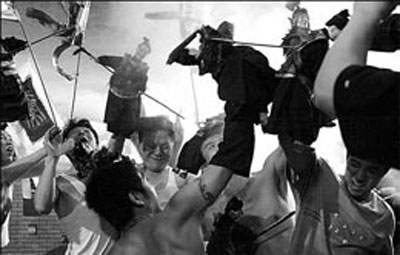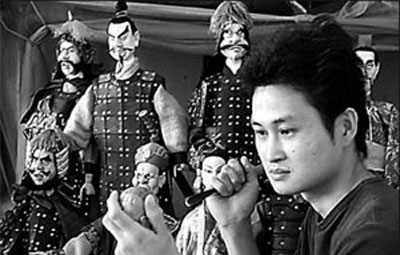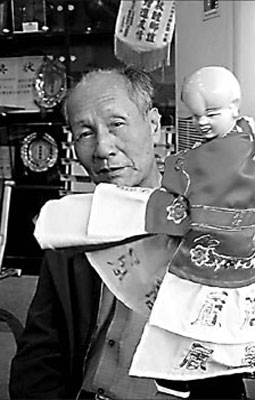With small moves of his fingers, palms and wrist, Chen Jintang of East China's Fujian Province makes a glove puppet on his hand spring to life, cough like an old man, or giggle like an innocent child.
Integrating the techniques of carving, painting and embroidery, and combining it with folk music, the glove puppet show is a complex traditional Chinese performing art.
In the skilled hands of performers, puppets sing, chant and fight. (photo: China Daily)
In the hands of a skilled puppeteer such as Chen, 66, the puppets sing, chant, fight and give vivid expression to express feelings such as joy, anger and grief.
Fujian's glove puppet tradition has developed along two lines, identified as the northern and southern branches. The Quanzhou shows belong to the southern branch, where the music employed is similar to that used for string puppet shows in the region.
The Zhangzhou shows, on the other hand, belong to the northern branch, of which the most famous is the glove puppetry of Longxi County.
Zhangzhou glove puppetry started in the Jin Dynasty (AD 265-420) and developed rapidly during the Ming Dynasty (1368-1644), before spreading across the straits to Taiwan and later, to Southeast Asia.
The making of glove puppets integrates the techniques of carving, painting and embroidery. (photo: China Daily)
In the early 20th century, Chen's father lived by selling fried bread sticks in south Taiwan's Tainan. In the 1940s, he moved to Zhangzhou where he joined a puppet show troupe.
Traditionally, the puppet show is held on a magnificent wooden stage with ornamental pillars. The exquisite puppet heads show the skills of ancient engraving techniques, while the puppets' garments are an expression of traditional culture, history and the art of embroidery.
During the War of Resistance against Japanese Aggression (1937-1945), however, puppet troupes struggled to make a living and survived by putting on street performances.
The turbulence of war left little space for the age-old folk arts to survive. Many puppet show artists had to find other means of earning a living. After the founding of New China, the government recognized the Zhangzhou puppet show as an important cultural heritage and helped the puppeteers reorganize their troupes. This led to the establishment of the Zhangzhou Puppet Troupe in 1951.
Chen's earliest instructor was his father, who taught him the ropes in 1956. Chen soon discovered that putting on a puppet show was no easy task - one has to be adept not only at the techniques of manipulation, but also possess a deep comprehension of traditional Chinese culture. A puppeteer must also be a good storyteller for he needs to present an entire plot during a show.
As a student of the art, Chen used to be up at 6 every morning to practice the complicated movements and learn the folk stories. He spent long hours watching - and imitating - the masters at work. It took him three years to grasp the magic of a presentation.
Recalling the decade of the 1950s, Chen says: "Puppeteers were able to feed themselves, and this art gradually gained mass popularity across the country, once again." He recalls that once when they toured a village by the sea, many fishermen wanted to trade their catch for a ticket to the show.
The Zhangzhou puppet show began to evoke interest abroad as well.
In 1959, the Zhangzhou Puppet Troupe was invited to Bucharest, capital of Romania, to attend a puppet show festival. It was the first time a Chinese traditional art troupe was visiting a foreign country.
Chen and other troupe members presented Da Ming Fu, a story adapted from the classical novel Outlaws of the Marsh (Shui Hu Zhuan). It won them a long ovation from the audience and a gold medal.
Since China's reforms and opening up, Chen and the troupe have traveled to more than 30 countries, putting on hundreds of shows.
Fujian folk artist Chen Jintang shows off one of his puppets. (photo: China Daily)
Chen remembers that after he played in London in 1987, some kids came backstage to see if the puppets were real.
In 1997, the troupe visited the city of Kaohsiung in Taiwan Province. Thanks to the opportunity provided by cross-Straits cultural exchanges, Chen got to see his father's hometown and meet his relatives.
In the past decade, this traditional art form has had to face challenges posed by multi-media technology and new forms of entertainment.
Chen calls it the "three screens" era. "Television screen, computer screen and mobile screen are the new platforms for the arts," he says.
However, he sees no threat from these to puppetry. "The puppet show has withstood the test of time and even survived the turbulence of war and depression because it has always been creative, keeping pace with the times and absorbing new elements," Chen says.
In recent years, the Zhangzhou Puppet Troupe has been cooperating with TV stations, film studios and media production companies to televise their new dramas, with brilliant lighting and advanced sound effects.
This year, Chen directed a 52-chapter puppet show titled Little Red Army Soldier in Long March, which will soon be on many television channels and also made available in digital format.
Hong Huijun, head of the Zhangzhou Puppet Troupe, says many youngsters have now taken up the study of this art form in colleges. The troupe, he says, is also planning to offer classes to those interested.
This interest pleases Chen who says the art of glove puppetry must never be allowed to die out.
(China Daily December 11, 2007)




